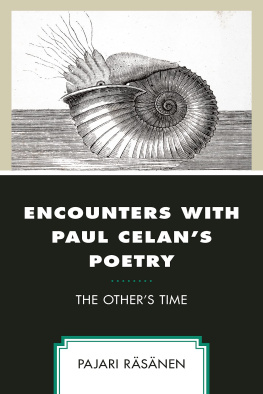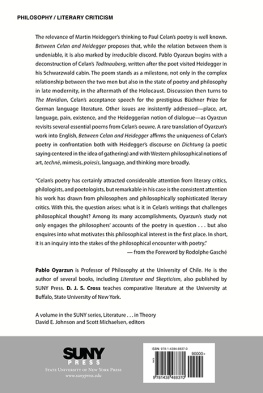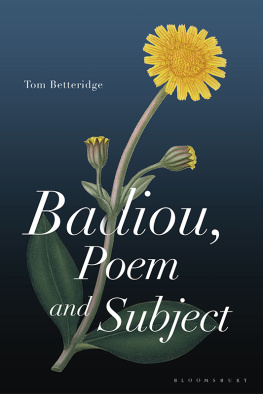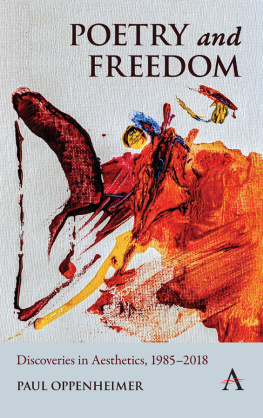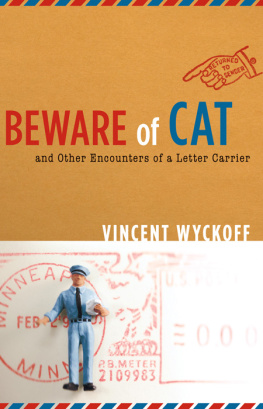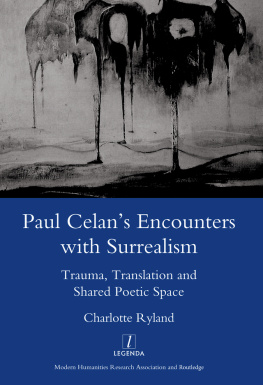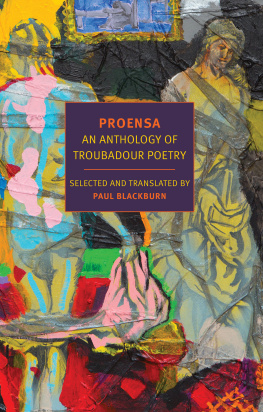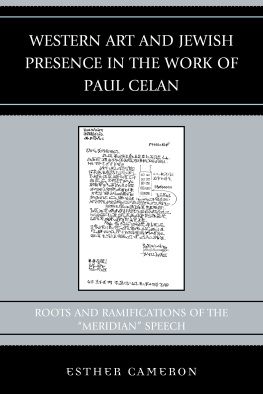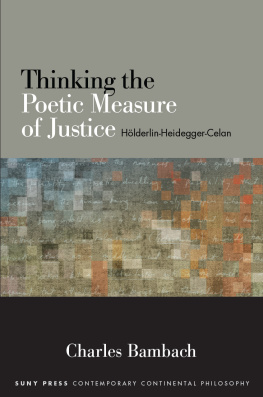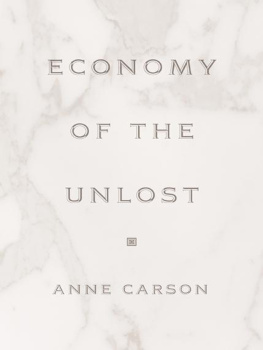Räsänen Pajari - Encounters with Paul Celans Poetry: The Others Time
Here you can read online Räsänen Pajari - Encounters with Paul Celans Poetry: The Others Time full text of the book (entire story) in english for free. Download pdf and epub, get meaning, cover and reviews about this ebook. year: 2021, publisher: Lexington Books, genre: Romance novel. Description of the work, (preface) as well as reviews are available. Best literature library LitArk.com created for fans of good reading and offers a wide selection of genres:
Romance novel
Science fiction
Adventure
Detective
Science
History
Home and family
Prose
Art
Politics
Computer
Non-fiction
Religion
Business
Children
Humor
Choose a favorite category and find really read worthwhile books. Enjoy immersion in the world of imagination, feel the emotions of the characters or learn something new for yourself, make an fascinating discovery.
- Book:Encounters with Paul Celans Poetry: The Others Time
- Author:
- Publisher:Lexington Books
- Genre:
- Year:2021
- Rating:4 / 5
- Favourites:Add to favourites
- Your mark:
- 80
- 1
- 2
- 3
- 4
- 5
Encounters with Paul Celans Poetry: The Others Time: summary, description and annotation
We offer to read an annotation, description, summary or preface (depends on what the author of the book "Encounters with Paul Celans Poetry: The Others Time" wrote himself). If you haven't found the necessary information about the book — write in the comments, we will try to find it.
Encounters with Paul Celans Poetry: The Others Time — read online for free the complete book (whole text) full work
Below is the text of the book, divided by pages. System saving the place of the last page read, allows you to conveniently read the book "Encounters with Paul Celans Poetry: The Others Time" online for free, without having to search again every time where you left off. Put a bookmark, and you can go to the page where you finished reading at any time.
Font size:
Interval:
Bookmark:

Encounters with Paul
Celans Poetry
Encounters with Paul
Celans Poetry
The Others Time
Pajari Rsnen
LEXINGTON BOOKS
Lanham Boulder New York London
Published by Lexington Books
An imprint of The Rowman & Littlefield Publishing Group, Inc.
4501 Forbes Boulevard, Suite 200, Lanham, Maryland 20706
www.rowman.com
86-90 Paul Street, London EC2A 4NE
Copyright 2021 by The Rowman & Littlefield Publishing Group, Inc.
Please see full list of copyright permissions on page 219.
All rights reserved. No part of this book may be reproduced in any form or by any electronic or mechanical means, including information storage and retrieval systems, without written permission from the publisher, except by a reviewer who may quote passages in a review.
British Library Cataloguing in Publication Information Available
Library of Congress Cataloging-in-Publication Data
Names: Rasanen, Pajari, author.
Title: Encounters with Paul Celans poetry : the others time / Pajari Rasanen.
Description: Lanham : Lexington Books, [2021] | Includes bibliographical references and index.
Identifiers: LCCN 2021030847 (print) | LCCN 2021030848 (ebook) | ISBN 9781793632555 (cloth) | ISBN 9781793632562 (epub)
Subjects: LCSH: Celan, PaulCriticism and interpretation. | LCGFT: Literary criticism.
Classification: LCC PT2605.E4 Z743 2021 (print) | LCC PT2605.E4 (ebook) | DDC 831/.914dc23
LC record available at https://lccn.loc.gov/2021030847
LC ebook record available at https://lccn.loc.gov/2021030848
 The paper used in this publication meets the minimum requirements of American National Standard for Information SciencesPermanence of Paper for Printed Library Materials, ANSI/NISO Z39.48-1992.
The paper used in this publication meets the minimum requirements of American National Standard for Information SciencesPermanence of Paper for Printed Library Materials, ANSI/NISO Z39.48-1992.
Contents
I: Everything Twice Over
In the beginning of the second act of Georg Bchners Dantons Tod , Camille Desmoulins urges Danton to make haste: CAMILLE. Rasch Danton wir haben keine Zeit zu verlieren. / DANTON ( er kleidet sich an ). Aber die Zeit verliert uns ( Camille . Hurry, Danton, we have no time to lose! / Danton [ dressing himself ]. And yet, time loses us).perhaps even that Dantons Death is Dantons second life, on stage; or that historical events (geschieht: Geschehen , Geschichte ) are repeated in the written history, or the historical drama; or that the words recorded once are destined to be repeated, cited, and recited indefinitely, millions and millions of times; or that one life always consists of two halves that are phenomenally indistinguishable (let us say, the private and the public, the singular and the repeatable, etc.).
Let us leave open the question concerning the identity of the two halves, namely whether the difference that divides Danton and us all is, for instance, temporal, ontological, sexual, ethical, or semiotico-linguistic; that is, whether one half is the first and the other is the second in time, repeating the first half as the citation literally suggests; or whether our halves long for each other and their (i.e., our) primordial unity, driven by affection or auto-affection; or whether it is a question of the difference between the conscious and the unconscious, or consciousness and conscience, as the latter seems to dictate the word September to Danton who utters it without conscious intention (II.5; as Peter Szondi remarks, it is not of Dantons own decision that he is summoned to appear before the tribunal of his own conscience, accused of the September massacres of 1792); are the same while being different, in the world of this drama that repeats things done and said in the historical world, and whether the one or the other is the real, the authentic Danton; and further, whether these questions concerning words and deeds, the sign and the referent, intention and expression, extension and intension, et cetera, concern us all. We leave open the question whether the two halves are one of these, all of these at once, or none of these alternatives.
The word doppelt occurs in Dantons Tod not just twice, but three times: besides this dialogue between Danton and Camille, in the scene played out at the Jacobine Club (Sie sind witzig und sagen, man mu Marat und Chalier zu einem doppelten Mrtyrenthum verhelfen, und sie in effigie guillotiniren, I.3; 1st ed. 1835, 2324; They are witty and say that Marat and Chalier must be helped to a second martyrdom, that they must be guillotined in effigy; their already dead bodies should double as the effigy of others), and in Fabres words of farewell to Danton: Lebe wohl Danton. Ich sterbe doppelt (IV.7, 1st ed. 1835, 149; Farewell, Danton! I die twice over). His death will happen a second time when his friend dies; there is a touch of dramatic irony in the greeting of the moribund man, as lebe wohl means literally live well, and the men are lined up to be executed one right after the other; but there is an even deeper irony in the phrase I die twice over, since the possibility of dyingdying once, let alone twicehas been called into question
Alles doppelt: this clause echoes also in a poem by Paul Celan, written in 1968 and published in the posthumous volume Schneepart (1971). This could be a coincidence, or the source could be elsewhere (Souvenons-nous que tout est double, a fragment underlined by Celan in his personal copy of Jouberts Penses ), but this kind of chance encounter is not to be dismissed as inessential; as a matter of fact, suchlet us say: allegoricalpotential of poetry is thematized by Celan, as we shall see later on. Allegorical potential meaning, here, that one and the same formula or speech event can be repeated or effectively reproduced in different occasions; that it is double, always already, both singularly unrepeatable and repeatable, unreadable and readable.
Unlesbarkeit dieser
Welt. Alles doppelt.
Die starken Uhren
geben der Spaltstunde recht,
heiser.
Du, in dein Tiefstes geklemmt,
entsteigst dir,
fr immer.
Alles doppelt: everything doubles, is doubled, or all things twice over; here doppelt could be either the third person singular indicative of the verb doppeln or the participial adjective translatable as double or doubled; Alles doppelt could be understood either as the simultaneous presence of all things or the repetition of everything, twice over. Unreadability, or untranslatability becomes at least doubly translatable; Alles doppelt is doubled in translation, twice over. The unreadabilityillisibilityof this world is double, too: Unlesbarkeit dieser Welt may refer to this one and only world we have, everything in this world, but it could also refer to the kind of unreadability that pertains to the worldliness of this world, the mundane unreadability or the mundanely unreadable, this-worldly ( dieserweltlich ) in opposition to the other-worldly ( anderweltlich ) that could be either unreadable or un-unreadable, which we do not know, as all we have is the unreadability of this world that prevents the reading of the other world as well. What the poem says of or about this world (it) applies to itself, as part of this world or as a world of its own; here, the parentheses around it are necessary to suggest another doubling: we can read it either with it, so that its intention is to reflectively apply what it says to itself, or we can read it in brackets, so that the logic of the first stanza applies also to the poem, as if in spite of its intention or will to speak only of the world outside, or of the unreadability that pertains to this world about which it speaks. So this world is also double, at least double: either it means ( meint , intends) the world outside, excluding itself as the statement about the world, or it means also itself, including itself among the illegible things of this world, everything, das All or alles . And it could be self-referential, as this world could be the world of the poem, of poetry, of language or writing, a world written asunder [auseinandergeschrieben] ( Die Gedichte , 113). It is at least double, since if everything doubles, is doubled, or happens twice over, also the double doubles, is doubled, happens again and again, and the phrase alles doppelt echoes ad infinitum .
Font size:
Interval:
Bookmark:
Similar books «Encounters with Paul Celans Poetry: The Others Time»
Look at similar books to Encounters with Paul Celans Poetry: The Others Time. We have selected literature similar in name and meaning in the hope of providing readers with more options to find new, interesting, not yet read works.
Discussion, reviews of the book Encounters with Paul Celans Poetry: The Others Time and just readers' own opinions. Leave your comments, write what you think about the work, its meaning or the main characters. Specify what exactly you liked and what you didn't like, and why you think so.

